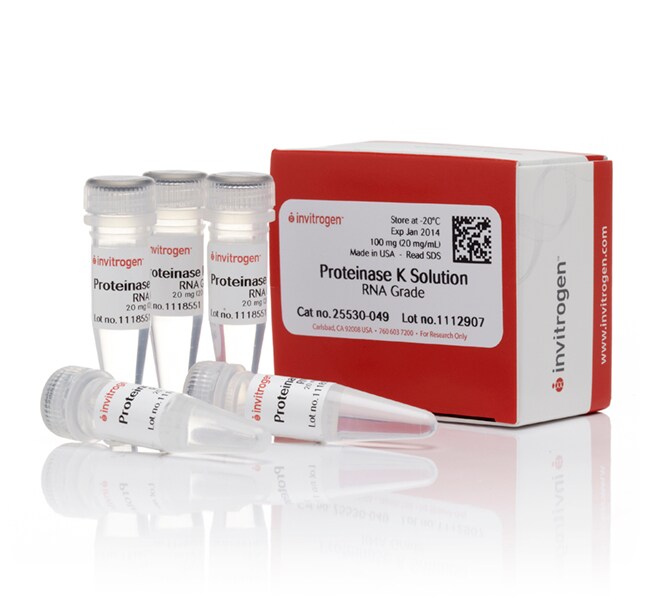Search Thermo Fisher Scientific

Invitrogen™
Proteinase K Solution (20 mg/mL), RNA grade
Proteinase K from the fungus Engyodontium album is a nonspecific serine protease that is useful for general digestion of proteins.Read more
| Catalog Number | Quantity |
|---|---|
| 25530049 | 5 mL |
Catalog number 25530049
Price (USD)
227.65
Online Exclusive
245.00Save 17.35 (7%)
Each
In stock
Quantity:
5 mL
Price (USD)
227.65
Online Exclusive
245.00Save 17.35 (7%)
Each
Proteinase K from the fungus Engyodontium album is a nonspecific serine protease that is useful for general digestion of proteins. Proteinase K remains active:
• Over a wide pH range—optimal activity between 6.5 and 9.5
• Under denaturing conditions—e.g., in the presence of SDS or urea
• In the presence of metal chelating agents—e.g., EDTA
• At comparatively high temperatures—optimum digestion temperature is 65°C
Applications
Removal of endogenous nucleases during the preparation of DNA and RNA; preparation of tissue sections for in situ hybridization.
Performance and quality testing
Endodeoxyribonuclease and exodeoxyribonuclease assays; liquid form tested for absence of RNase activity.
Unit definition
One mAnson unit is described as that amount of enzyme that liberates 1 μmole of Folin-positive amino acid within 1 min at 37°C using hemoglobin as a substrate.
• Over a wide pH range—optimal activity between 6.5 and 9.5
• Under denaturing conditions—e.g., in the presence of SDS or urea
• In the presence of metal chelating agents—e.g., EDTA
• At comparatively high temperatures—optimum digestion temperature is 65°C
Applications
Removal of endogenous nucleases during the preparation of DNA and RNA; preparation of tissue sections for in situ hybridization.
Performance and quality testing
Endodeoxyribonuclease and exodeoxyribonuclease assays; liquid form tested for absence of RNase activity.
Unit definition
One mAnson unit is described as that amount of enzyme that liberates 1 μmole of Folin-positive amino acid within 1 min at 37°C using hemoglobin as a substrate.
For Research Use Only. Not for use in diagnostic procedures.
Specifications
For Use With (Application)Chromatin Biology/RNA Extraction/DNA Extraction
Product TypeProteinase K
PurityDNase-Free, RNase-Free
Quantity5 mL
Shipping ConditionApproved for shipment on Wet or Dry Ice
Concentration20 mg/mL
FormLiquid
Unit SizeEach
Contents & Storage
Store in freezer (-5 to -30°C).